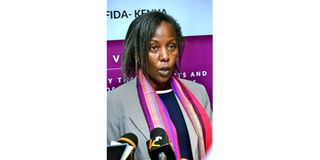Cause for concern as GBV cases remain high

Federation of Women Lawyers-Kenya chairperson Nancy Ikinu briefs the media during the Women Leadership Conference at Radisson Blu on August 27, 2021. A Fida-Kenya survey has revealed a rise in GBV in Kenya.
What you need to know:
- A survey by Fida-Kenya has revealed that Nairobi, Kisumu and Mombasa had the highest prevalence between April 2021 and January this year.
- The state of GBV has been rocked by controversy, with some human rights organisations accusing the government of laxity even as the latter cites its efforts and the progress made.
Gender-based violence (GBV) is surging in Kenya, the Federation of Women Lawyers (Fida) has cautioned.
Fida-Kenya says the cases reported on its toll-free line in January were over 176, an increase from the 161 recorded in December last year. It attributes the surge to economic constraints due to the Covid-19 crisis. Women and girls are the greatest casualties.
Of the 9,891 cases reported during a survey conducted from April 2021 to January, GBV accounted for 1,637, while 3,608 involved child custody and maintenance. Common forms of GBV reported were physical assault, rape, defilement, attempted rape, and child marriages.
The line was launched in April 2020, to help GBV victims report incidents at the height of the coronavirus crisis.
According to the report, Nairobi, Kisumu and Mombasa have the highest prevalence. Kiambu, Kajiado, Kakamega, Kilifi, Uasin Gishu, Siaya, Nakuru and Taita Taveta also recorded cases, as did Vihiga, Bungoma, Lamu and Kitui.
Distress calls
Fida-Kenya chairperson Nancy Ikinu, said they receives distress calls and appeals from women and girls daily. She underscored the need to put up more shelters for victims who require rescue and support.
“It is high time the government and well-wishers came together to support the few safe shelters in the country to enable them to adequately handle the increasing demand for their services by GBV survivors,” she said.
The state of GBV in the country has been rocked by controversy, with a section of human rights organisations differing with the government on the way cases are handled.
In September last year, the Human Rights Watch (HRW) and the government differed on the state of GBV in the country since the onset of Covid-19.
Laxity
A report released by HRW, titled I had nowhere to go: Violence against Women and Girls during the Covid-19 pandemic in Kenya, accused the government of laxity in dealing with GBV, dismissing its efforts as “too little too late”.
The report documented how the government’s failure to provide services that prevent GBV and lack of assistance to survivors led to an increase in violence against women and girls.
Survivors, the report indicated, faced increased harm as they had no access to comprehensive, quality and timely medical treatment, mental healthcare and protection services, financial assistance and proper investigation and prosecution of cases.
“Kenyan authorities failed to anticipate and properly plan for the risk of increased sexual and GBV during the Covid-19 pandemic, and, therefore, did not prioritise and include critical early warning, detection, data collection, and protection measures in national and county-level contingency plans and budgets for containing the Covid-19 pandemic,” the report reads in part.
State denies wrongdoing
This lapse, the report noted, contributed to a delayed response to GBV and a late rush to implement response measures said to have been largely insufficient and ineffective. However, Public Service and Gender Cabinet Secretary Margaret Kobia, in a press statement, refuted claims by the human rights organisation.
The CS enumerated initiatives undertaken by the government since the onset of the pandemic, including establishment of eight GBV shelters built through National Government Affirmative Action Fund (NGAAF) and 52 other safe spaces through civil society organisations (CSOs).
She added the state had also established GBV recovery centres in all level 5 hospitals. Prof Kobia said the government had provided immediate assistance to GBV and female genital mutilation survivors through online counselling, referral for medical and legal services and safe spaces through toll-free help line 1195.
“In response to the pandemic, the government resolved to mitigate and de-escalate the vice by deploying a multi-agency approach bringing together county governments, gender sector working groups, development partners and non-state actors,” said Prof Kobia.
The CS added that while the government had no intention to undermine the findings, particularly the experiences of the 13 GBV victims, it was misleading to the organisations to generalise and condemn the state wholesale based on a non-representative sample of 26 persons.




